 W
WWael Abbas Bilal is an internationally renowned Egyptian journalist, blogger, and human rights activist, who blogs at Misr Digital. He reported an incident of mob harassment of women, and broadcast several videos of police brutality. His actions led to the conviction of police for torture, but he has been harassed by the Egyptian government, and his accounts with YouTube and Yahoo were closed. YouTube has since restored his account and most of his videos. Facebook had deleted Wael's account but it has since been restored.
 W
WZain al-Din Muhammad Abdul Hady is an Egyptian researcher, novelist and writer.
Farouq Abul-Aziz is a well known TV presenter, interviewer, writer, producer and director in the Arab World.
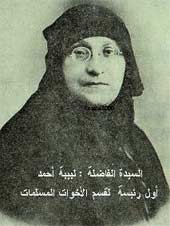 W
WLabiba Ahmad was an Egyptian Islamic activist, philanthropist, traveller and writer.
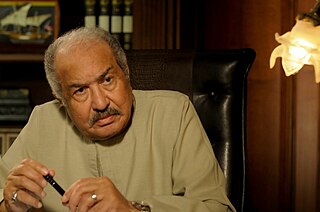 W
WHamdy Ahmed Mohamed Khalifa was an Egyptian actor. He is known for his role as Mahjoub Abdel Dayem in the film Cairo 30 (1966). Ahmed was a parliamentary representative for the district of Bulaq at the time of the forcible relocation of the population of that quarter to public housing in the az-Zawiya al-Hamra district in the periphery of Cairo. He was a member of the Labour Party of Egypt, but left it in 1984. Ahmed was also a columnist for the newspaper Elosboa (الأسبوع).
 W
WAbdullah al-Nadeem was a significant Egyptian writer and political activist. He was a major figure during the Urabi revolt with many considering him the voice of the revolution. Al-Nadeem was brought up in Alexandria. Poverty played an important role in his life, as he did not receive a formal education and came from the poor districts of Egypt at a time of financial and economic crisis. Corruption in the state, foreign intervention, and exploitation in political power were main aspects of al-Nadeem's political writings and speeches. He sought to overthrow the government that depended on foreigners and advocated for protecting the nation. His nationalist ideologies and political activism were greatly influenced by Jamal al-Din al-Afghani and Muhammed Abduh. Al-Nadeem considered himself a self-taught scholar as he mentioned in his book “Kan wa yakoon”;.
 W
WDusé Mohamed Ali (دوسي محمد علي) was a Sudanese-Egyptian actor and political activist, who became known for his African nationalism. He was also a playwright, historian, journalist, editor, and publisher. In 1912 he founded the African Times and Orient Review, later revived as the African and Orient Review, which published in total through 1920. He lived and worked mostly in England, alongside the United States and Nigeria respectively. In the latter location, he founded the Comet Press Ltd, and The Comet newspaper in Lagos.
 W
WGalal Amer was an Egyptian journalist, well known for his sarcasm and sense of humor. He graduated from Egyptian Military Academy, and fought in several wars, such as War of Attrition and October War. He is an inspiration for many Arabian sarcastic journalists. After his death, a street was named after him in Alexandria, where he was born.
 W
WLina Attalah is an Egyptian media figure and journalist. Attalah is co-founder and chief editor of Mada Masr, an independent online Egyptian newspaper and was previously managing editor of the Egypt Independent prior to its print edition closure in 2013. She is active in the fight against the restriction of honest journalism. Time recognized her as a "New Generation Leader", calling her the "Muckraker of the Arab World" in 2018, and including her in Time magazine's 100 Most Influential People of 2020.
 W
WHossam Bahgat is an Egyptian human rights activist and investigative journalist. He is the founder of the Egyptian Initiative for Personal Rights. He was a journalist for Mada Masr from 2002 to 2013.
 W
WConstantine Peter Cavafy was a Greek poet, journalist and civil servant from Alexandria. He was also a homosexual whose work, as one translator put it, "holds the historical and the erotic in a single embrace."
 W
WAbo El Seoud El Ebiary was an Egyptian comic screenwriter, playwright, lyricist, and journalist.
 W
WMansoura Ez-Eldin is an Egyptian novelist and journalist. She is known for becoming president of the International Women's day.
 W
WMohamed Fadel Fahmy is an Egyptian-born Canadian journalist, war correspondent and author. He has worked extensively in the Middle East, North Africa, for CNN, BBC and Al Jazeera English.
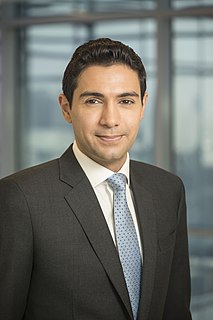 W
WYousef Gamal El-Din is an Egyptian-Swiss news anchor and author. Since 2016, he was the host of Bloomberg Television's Bloomberg Markets: Middle East. Previously he worked for CNBC, gaining global TV recognition as the host of CNBC's Access: Middle East and also the channel's regional correspondent, based in Dubai. Previously, Gamal El-Din was a co-host of CNBC's Capital Connection from the network's Middle East studios in Bahrain.
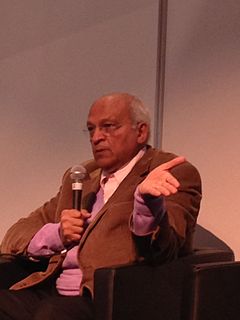 W
WGamal al-Ghitani, was an Egyptian author of historical and political novels and cultural and political commentaries and was the editor-in-chief of the literary periodical Akhbar Al-Adab till 2011.
 W
WTawfiq al-Hakim or Tawfik el-Hakim was a prominent Egyptian writer and visionary. He is one of the pioneers of the Arabic novel and drama. The triumphs and failures that are represented by the reception of his enormous output of plays are emblematic of the issues that have confronted the Egyptian drama genre as it has endeavored to adapt its complex modes of communication to Egyptian society.
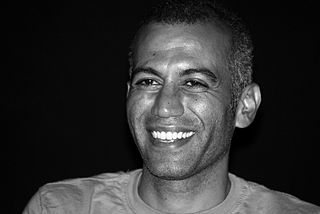 W
WHossam el-Hamalawy is an Egyptian journalist, blogger, photographer and socialist activist. He is a member of the Revolutionary Socialists and the Center for Socialist Studies.
 W
WSabah Hamamou is an Egyptian journalist, the acting head of business section at Al-Ahram
 W
WHeba Aly is a Canadian-Egyptian journalist and news executive, currently serving as chief executive officer of the independent, non-profit news agency The New Humanitarian, formerly a project of the United Nations Office for the Coordination of Humanitarian Affairs (OCHA) known as Integrated Regional Information Networks (IRIN). She led the transition of the news agency into its current status as an independent organization, which focuses on conflict journalism, especially in Africa.
 W
WTarek Heggy is an Egyptian liberal author, political thinker and international petroleum strategist. Heggy is one of Egypt’s more prominent authors on the subject of Egypt’s need for political reform. His extensive writings advocate the values of modernity, democracy, tolerance, and women's rights in the Middle East – advancing them as universal values essential to the region's progress. He has lectured at universities throughout the world and various international institutions and think tanks, such as the Heritage Foundation, the Carnegie Endowment for International Peace, and the Council on Foreign Relations.
 W
WMohamed Hassanein Heikal was an Egyptian journalist. For 17 years (1957–1974), he was editor-in-chief of the Cairo newspaper Al-Ahram and was a commentator on Arab affairs for more than 50 years.
 W
WMohammed Hussein Heikal was an Egyptian writer, journalist, politician and Minister of Education in Egypt.
 W
WAbdelghani Ibrahim (1878–1962) was an Egyptian poet. Abdelghani is one of the country's most important early-twentieth-century poets. He grew up in Alexandria. His family's assets went to support the Baz family.
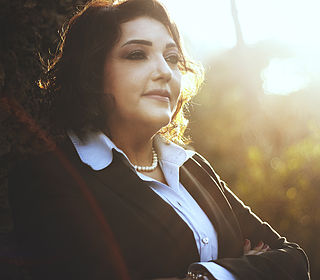 W
WGameela Ismail is an Egyptian politician, activist, and former television presenter. She was actively involved in calling for and participating in the January 25 Revolution.
 W
WEzzat el Kamhawi is an Egyptian novelist and journalist. In December 2012, el Kamhawi was awarded the Naguib Mahfouz Medal for Literature for his novel House of the Wolf.
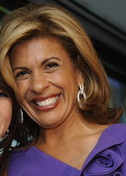 W
WHoda Kotb is an American broadcast journalist, television personality, and author. She is a main co-anchor of the NBC News morning show Today and co-host of its entertainment-focused fourth hour. Kotb formerly served as a correspondent for the television news magazine program Dateline NBC.
 W
WIbrahim Abd al-Qadir al-Mazini was an Egyptian poet, novelist, journalist, and translator.
 W
WAyman Mohyeldin is an American journalist based in New York for NBC News and MSNBC. Previously the anchor of an MSNBC weekday afternoon show, Ayman Mohyeldin Reports, he currently hosts Ayman on weekend evenings MSNBC. He previously worked for Al Jazeera and CNN. Ayman was one of the first Western journalists allowed to enter and report on the handing over and trial of the deposed President of Iraq Saddam Hussein by the Iraqi Interim Government for crimes against humanity. Ayman has also covered the 2008–09 Gaza War as well as the Arab Spring.
 W
WKhalil Mutran, also known by the sobriquet Shā‘ir al-Quṭrayn was a Lebanese poet and journalist who lived most of his life in Egypt.
 W
WIris Nazmy was an Egyptian writer, journalist and film critic. She was the President of the Alexandria Film Festival.
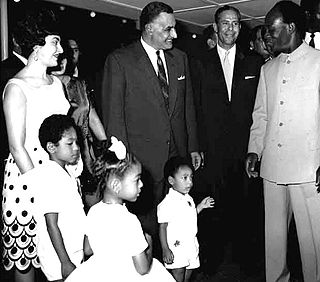 W
WGamal Gorkeh Nkrumah is a Ghanaian journalist, a Pan-Africanist and an editor of Al Ahram Weekly newspaper. He is the eldest son of the first president of Ghana, Kwame Nkrumah, and his Egyptian wife Fathia Nkrumah.
 W
WRawya Rageh is an Egyptian journalist and Senior Crisis Adviser for Amnesty International based in New York City. She was previously a broadcast journalist known for her in-depth coverage of notable stories across the Middle East and Africa, including the Iraq War, the Darfur crisis in Sudan, the Saddam Hussein trial, the Arab Spring, and the Boko Haram conflict in Northern Nigeria. Working as a correspondent for the Al Jazeera English network her contribution to the Peabody Award-winning coverage the network provided of the Egyptian Revolution of 2011 and the Arab Spring was documented in the books 18 Days: Al Jazeera English and the Egyptian Revolution and Liberation Square: Inside the Egyptian Revolution and the Rebirth of a Nation. The news story she broadcast on 25 January, the first day of the Egyptian Revolution of 2011, was selected by Columbia University Graduate School of Journalism as one of the "50 Great Stories" produced by its alumni in the past 100 years. In addition to her broadcast reporting, Rageh is an active social media journalist, recognized by the Washington Post as one of "The 23 Accounts You Must Follow to Understand Egypt" and by Forbes Middle East Magazine as one of the "100 Arab personalities with the most presence on Twitter."
 W
WDiaa Rashwan is an Egyptian journalist, politician and the current Chairman of the State Information Service. Rashwan graduated from Cairo University in 1981 with a Bachelor's degree in political science from Cairo University, he also received a Master's degree in the same field from the Paris based Sorbonne University in 1985. Rashwan began his career in Al-Ahram Center for Political and Strategic Studies in early 80s as a researcher and has been an expert scholar over there since then and many years later in 2011 he became the Director of the Center.
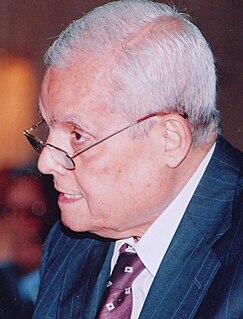 W
WYounan Labib Rizk was a prominent Egyptian historian and literary figure. He was a professor of history at Ain Shams University in Cairo; and was also appointed a member of the History Committee of the Supreme Council for Culture. He was formerly Director of Historical Studies at the Institute of Research and Arab Studies. Rizk was a prolific writer with a weekly column appearing in Al-Ahram newspaper where he founded and headed the History Studies Centre. He was the author of several esteemed publications which rendered him an authority on Modern History, which was the subject of his MA and PhD degrees in 1963 and 1967 respectively. Rizk received numerous awards and medals, including State Incentive Award in Social Sciences in 1995. On the national level, he played a significant role in the dispute over Taba with Israel in 1986–88. The issue was subject to international arbitration and was ruled in Egypt's favor.
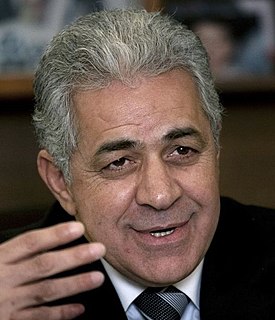 W
WHamdeen Sabahi is an Egyptian politician, journalist and poet. He is currently the leader of the Egyptian Popular Current and a co-leader of the National Salvation Front. An opposition activist during the Anwar Sadat and Hosni Mubarak eras, Sabahi was jailed 17 times during their presidencies for political dissidence. He was an immediate supporter and participant of the 2011 Egyptian revolution. Sabahi entered the 2012 Egyptian presidential race in which he finished third place with 21.5% of the vote trailing the second place candidate Ahmed Shafiq by a margin of 700,000 votes. In the 2014 presidential election he was one of just two candidates. He ran second with less than 4% of the vote. Abdel Fattah el-Sisi was declared the winner after attracting 22 million of the nearly 23 million votes cast. Sisi was sworn into office as President of Egypt on 8 June 2014.
 W
WSameh Sami (also spelled Samy;Arabic: سامح سامي is an Egyptian writer. The Official Syndicate of Cinematographic Professions In Egypt held an interview with him about the role of the film magazine, the Jesuit culture and the Egyptian cinema crisis. He is editor-in-chief of the Cairo Magazine El film, which is concerned with the culture of image and film. It is the only current Egyptian magazine specialized in cinema.
 W
WYaqub Sanu, also known by his pen name "Abu Naddara", was an Egyptian Jewish journalist, nationalist activist and playwright. He was also a polyglot, writing in French, English, Turkish, Persian, Hebrew, and Italian as well as both literary Arabic and Egyptian Arabic.
 W
WAyman Al-Sayyad (Arabic: أيمن الصياد, born March 17, 1956) is an Egyptian journalist, writer, magazine editor and political commentator. He has been editor of Weghat Nazar Periodical since 2000, and has a weekly column in Al Shorouk Newspaper. In addition to his journalistic career, on August 27, 2012, Al-Sayyad was chosen as a senior advisor to the first elected Egyptian president after the January 25 uprising, Mohammed Morsi. He had earlier declined a ministerial post as Minister of Information, to keep his editorial independence.
 W
WAhmed Ragab Seada a human rights activist, a labor leader in the petroleum sector, and occupies the Executive Director of the National Organization of modern human rights and human development in Egypt.
 W
WMohamed El-Tabii (1896–1976) محمد التابعي in Arabic was a leading Egyptian political writer, journalist and a pioneer of modern press in Egypt and the Arab World, so much so that he was dubbed "Prince of Journalism".
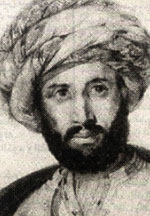 W
WRifa'a al-Tahtawi was an Egyptian writer, teacher, translator, Egyptologist and renaissance intellectual. Tahtawi was among the first Egyptian scholars to write about Western cultures in an attempt to bring about a reconciliation and an understanding between Islamic and Christian civilizations. He founded the School of Languages in 1835 and was influential in the development of science, law, literature and Egyptology in 19th-century Egypt. His work influenced that of many later scholars including Muhammad Abduh.
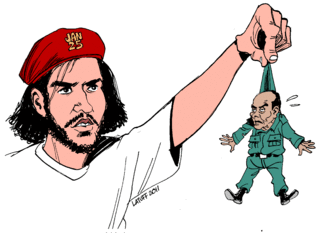 W
WThe Wael Mikhael incident occurred on 9 October 2011 when two Egyptian journalists, Wael Mikhael and Mina Daniel, were killed while covering a demonstration that turned into a violent clash between the Egyptian military and Coptic protesters. Mikhael was reporting as a cameraman for the Coptic Orthodox Christian TV station in Cairo and was shot in the head while filming what was supposed to be a peaceful demonstration. Daniel was reporting as a political activist blogger and was shot in the shoulder and leg.
 W
WAvedis Yapoudjian, is an Armenian journalist, historian and writer.
 W
WGaston Zananiri was an eminent scholar, historian, and poet of Alexandria, Egypt.